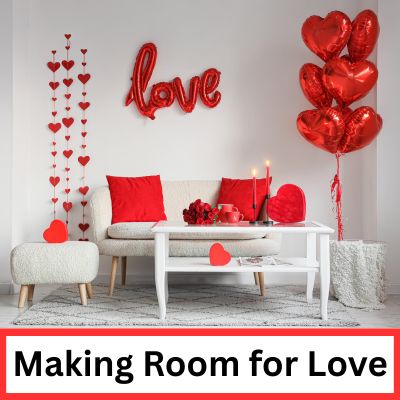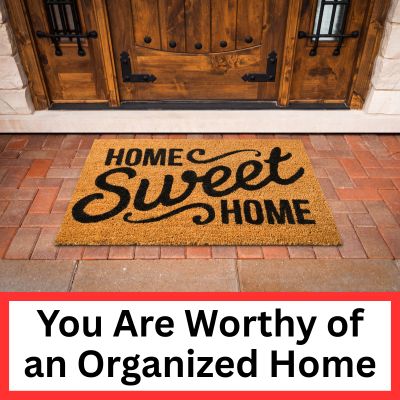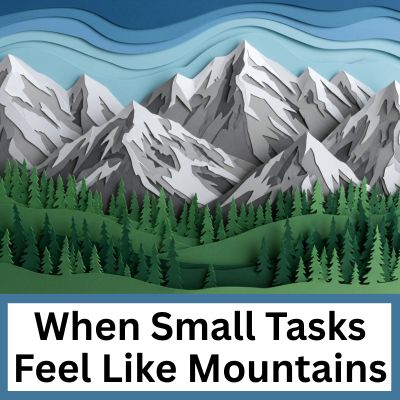Boundaries and Home Organizing

Whether or not you have ADHD, cultivating healthy boundaries can be a lifelong challenge for many people. If you’re suffering from weak boundaries, it can show up in all sorts of ways that will impact the organization of your home. Here are some examples of what that might look like:
Your schedule. Your calendar is chock full of meetings, phone calls, and other obligations. You say “yes” when you want to say “no”, or “no” when you want to say “yes”. You give so much of your time away to others, and forget to keep enough room in your schedule for your own self care. You optimistically overlook the fact that if you agree to take on another project, you will have to sacrifice time that you might spend exercising, sleeping, or tidying up your home. You may feel that you are constantly in “urgent and important” mode, and never have time to give yourself or your home the loving attention in needs. Or you may have a difficulty following a schedule at all.
You surround yourself with “stuff”. If you’ve had a challenge with other people violating your boundaries, you may have developed a coping mechanism of surrounding yourself with more and more of your belongings, symbolizing a wall between you and others, to keep yourself safe. You may have legitimately needed to do this, because the environment you grew up in taught you that it was dangerous to be vulnerable. Even though you may no longer live in an emotionally or physically dangerous place, those housekeeping habits have stuck with you in adulthood.
You’re up in your head. You spend too much mental energy on toxic relationships, thinking about someone else, wishing they were different, that you can’t focus on more important priorities. Your emotions are out of control, you may spend lots of time journaling, reading books on interpersonal dynamics, and the more you try to get your mind off of the other person, the stronger the thoughts get. You’re not happy, nor are you productive. It may feel like a rollercoaster of hope and grief, yet you feel powerless over your situation. With all of this energy spent on someone else, your home will look and feel as though you’ve abandoned it (unless you’re someone that channels their stress into cleaning of course!). You may also dive into patterns of over-exercising, which will wear you down, add more stress to your day, and you won’t have time to take care of your home.
Guilt. You have a nagging feeling that someone else wants something from you. Even if you’ve said “no”, your inner people-pleaser will not quiet itself. You may not be able to enjoy yourself because you’ve let someone down. Your thoughts might be defensive, ruminating on why your “no” was valid, and you can’t channel your energy into more meaningful endeavors that actually feed your soul. Or if you’ve said no because you lied and told someone you “didn’t feel very good” you may feel like you have to continue to act sick so that you don’t feel guilty for lying. Whether you’re mind is in a cycle of defensive rumination, or you’re laying on the couch to soothe your pretend tummy ache, you’re not able to let your real self shine through. When you can really feel good about who you are, what you’re doing, and the decisions that you’re making, your joyful authentic flow will seemingly magically organize your home for you. It’s pretty cool!
You actually feel sick. In Dr. Gabor Mate’s book, “The Body Says No”, he talks about the illnesses that can manifest in the body when you don’t speak up for yourself. This book is well worth checking out. Chronic “saying yes when you mean no” behavior can result in chronic illness. It’s similar to the teachings of Louse Hay, who has many books on this topic, most notably “You Can Heal Your Life”, and “Heal Your Body”. These works are really a way to develop compassion for yourself and for others. My recommendation is to read these books with an open mind, since they may bring up feelings of self-blame, or feeling like a victim. If you can read them with a sense of curiosity, you may learn things about yourself that can help you reclaim your health. Then you can get back to organizing your home the way you want it to be.
Your energy level feels depleted. Do you feel fine, but then get into a room with someone who’s in a bad mood, and suddenly you get into a bad mood too? This can really cramp your style when it comes to home organizing. If you’re sensitive to energy, you’ve probably even realized you can just walk by someone outside, and if you’re not careful, your energy could get zapped. You won’t have the endurance, motivation, or inspiration to keep your home as organized as you’d like.
Low self esteem. If you’re boundaries are too permeable, you may be very sensitive to criticism. Your sense of self esteem could plummet if someone makes a comment that is less than supportive. Sometimes you will consciously be able to recognize that someone said something that hurt your feelings. Sometimes the effects of this feedback (whether meant with kindness or ill-intentions) could be much more sub-conscious, and you might not realize how much it offended you. Your home knows though! When your self esteem is suffering, you may not have the motivation to keep up with general housework, like dishes, laundry, and taking out the trash.
Your willpower muscle is diminished. The people who look like they have the strongest willpower are actually the ones that need to use it the least. When you’ve run out of your ability to exert willpower, it’s kind of like dropping your cell phone on the ground and instead of picking it up, you decide to stomp on it. This may show up in your home as difficulty following an organizing or cleaning routine, forgetting to put things away when you’re done with them, choosing to sit on the couch and eat a big bowl of popcorn instead of doing the dishes, or staying up way too late, and then starting the next day feeling groggy and mad at yourself for being so irresponsible. If you lack boundaries with your willpower, you may also have lots of unfinished projects laying around, creating more clutter.
Do you resonate with any of these issues around boundaries? If so, you are not alone! In my next post, I’ll talk about a variety of both conventional and non-conventional ways that will help you develop stronger boundaries so that you can have an easier time organizing your home. When it comes to boundary setting for yourself (in regards to home organization), what is the hardest for you? Send me a message , I’d love to create a blog post for you.

By Jean Prominski, Certified Professional Organizer
Download my free 5 week journal The Seattle Sparkle Method to Get Organized and Stay Organized
Sign up for my free 4 Day Color to Declutter Challenge.
Become part of a like-minded community by joining my Facebook Group, Declutter and Organize with Seattle Sparkle.
Ready to book a consultation? Complete this form.
For artwork to energize your home, order through jeanprominski.com or on Etsy.




